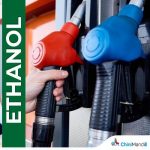Brazilian sugar exports last year represented more than 47% of the entire world’s sugar export, raw and white sugar combined. They have an outsized influence on the market, and remember, last year they directed only 46.65% of their cane resources to sugar. The rest of the cane went to ethanol production. This year there has been a slight swing to ethanol so only 46% of the cane is heading to sugar.
So what happens going forward?
Brazil has several challenges it will have to deal with and how it copes with those challenges is going to signal how the future of Brazilian sugar will go.
i) Peak fuel demand. BloombergNEF, the energy analyst from Bloomberg, now expects peak fuel demand to be even earlier than the 2031 they had thought last year. They are now bringing that forward to 2027. This is a global turning point, and it will be led by The EU and the United States, and pushed by government regulations, either supporting electric vehicles (EV) or punishing fossil fuel powered cars. Brazil will be a laggard, given that such a large percentage of Brazil’s Otto cycle is so dependent on ethanol. Still, as the principal large auto manufacturers shift to EVs, other countries will be obliged to follow. So what happens to Brazil’s ethanol program if the country begins shifting to EVs? With 54% of sugarcane going to ethanol, that leaves as much as 37.8 MMT of potential ADDITIONAL sugar production that could begin to come on stream. Of course, we don’t expect this ever to shift fully. Ethanol will still be used as a mix, if only as an oxygenate. Brazil will most likely avoid any government policy pushing EVs for as long as possible.
ii) Amazon deforestation. The deforestation of the Amazon during the administration of Bolsonaro has ramped up deforestation to its fastest rate in 12 years. In April of this year, deforestation increased by 43%, though the first four months of the year was down 4% from last year. The administration has made positive statements about protection, but actions speak louder than words, and the administration has made no bones about trying to push agricultural growth, with no thought as to the future of one of its most precious resources. The Amazon over the last ten years has been a net carbon emitter as the burning of the forest goes on, and it has been in the last five years that rainfall has been less than normal. Last year, even the Pantanal was burning and this year the dry spell in the Amazon has been the worst in 30 years. This is not a coincidence, this is a trend and if the deforestation of the Amazon continues so will the droughts in South America.
So we have two factors going forward for Brazil.They aren’t immediate issues. (Well, dry weather harming the 21/22 crop is ongoing) But, for one, we have an uncertain future with regards to ethanol. This could change if the development of fuel cell technology with the use of ethanol as a fuel source takes hold. So far fuel cell technology is running behind the typical EV path, but it could take hold if the cost of lithium, cobalt and copper increase the cost of EVs excessively. Right now, however, the cost of fuel cell cars will need to fall more, and I am honestly not sure if ethanol fuel cell cars can use existing gas/ethanol pump logistics, or they need additional development (More cost).
The other issue is how will weather develop for Brazil if she continues to devour her tropical rainforest? The Amazon is vital for generating moisture for the continent and at some point scientists believe there is a tipping point that will be reached. But this is not a light switch, where we reach a point and things suddenly shift. There is, in fact, a good chance the tipping point has already been reached. Without a cessation of deforestation, the climate will just continue to deteriorate.
A large portion of the Brazilian sugar and ethanol sector was bankrupted due to Government policy back between 2006 and 2011, when they froze gasoline prices, which just so happened to coincide with the 2008 financial crisis. Now, government policy on deforestation could very well impact sugarcane production (As well as all agricultural production for the country). This is perhaps open to debate by some, but once those in charge figure it out, it could be too late. Beyond that, perhaps the government could help in providing incentive to auto manufacturers as well as the sugar and ethanol sector to develop fuel cell technology. But instead they are trying to help independent truckers and keeping fuel prices at a discount to international prices. In this way they are stifling ethanol consumption and not helping at all.
How will the future of sugar and ethanol develop for Brazil?
You can see from present policies. Troubling!!
Click here to read Episode 1
Click here to read Episode 2
Click here to read Episode 3
Click here to read Episode 4
Click here to read Episode 5
Click here to read Episode 6
Mr. Michael McDougall is Managing Director at Paragon Global Markets, LLC, New York, USA. He has been active in commodity futures for 35 years.















